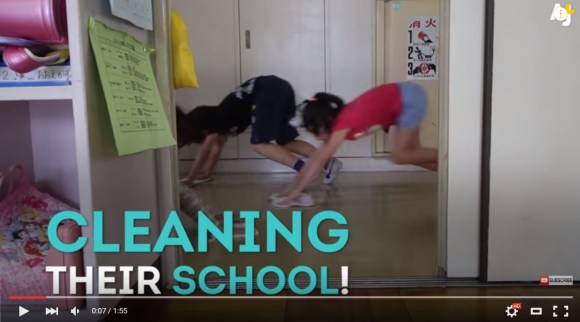
Why pay a janitor to clean the school when it’s filled with lively little laborors?
How many of our readers living in western countries remember cleaning up their classrooms and school grounds every day, or serving lunch to your classmates in your homeroom? I know it varies from region to region, and even from school to school, but the most cleaning we ever did at my school was erasing the chalkboard, and maybe giving overhead projector a quick wipe. We would of course have a big end-of-the-year cleaning before classes ended for summer, but even then all that consisted of was emptying out our desks and wiping them down.
Lunch too was certainly not handled by the students. If we had chosen to buy school lunch that day we would file through the lunch line in the cafeteria and be served by the lunch ladies, who slaved away all day in the kitchen reheating the processed, frozen food that was shipped to all public schools throughout the district.
Things are, however, quite different in Japan.
School lunch is still prepared in the kitchen by hired cooking staff—generally prepared from more fresh ingredients, not packaged frozen foods—but it is the students who wheel carts of food to their classrooms and serve their classmates.
After lunch, students clean up after themselves, and continue their cleaning duties by dusting, sweeping, and wiping down the floors in their classrooms, hallways, and throughout other areas of their school.
Elementary teacher Kyoko Takishima explains that children do this to build confidence and to help prepare them for adulthood.
Alice Gordenker, writer over at The Japan Times, explains that it also helps the kids to respect their surrounding, writing: “They are learning that it’s better not to make a mess if you are the one who has to clean it up.” Gordenker also alludes to a custom at some schools that she finds especially endearing: “A group of sixth-graders is sent to each first-grade classroom to help the little kids clean. Many schools provide this kind of interaction between the upper and lower grades because so many Japanese kids are hitorikko (only children, i.e., they have no siblings). Teachers believe older students need to experience helping younger children. And little kids need older role models.”
Of course, this doesn’t mean that Japanese schools don’t have custodians. Janitors, called yōmuin, are still employed by schools to handle maintenance and repairs, clean any areas that students may not be in charge of (not all schools have students clean the toilets, for example), and to follow up with a deeper clean than what the students may be able to achieve. Many commentors on the above video love the fact that the kids have to clean up their own space, wishing it were implemented at schools in the west.
But how do the kids feel about all of this? We’re sure not all kids particularly like cleaning, but here is one girl who can see the glass half full:
Tell us about your experiences! Did you have to clean your school classroom? Do you wish they would implement this custom at schools where you live, or do you think kids school be spending their time studying instead?
Source: YouTube/AJ+ via CuRAZY, The Japan Times
Images: YouTube/AJ+

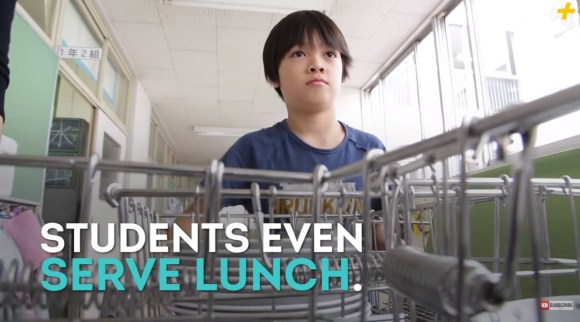
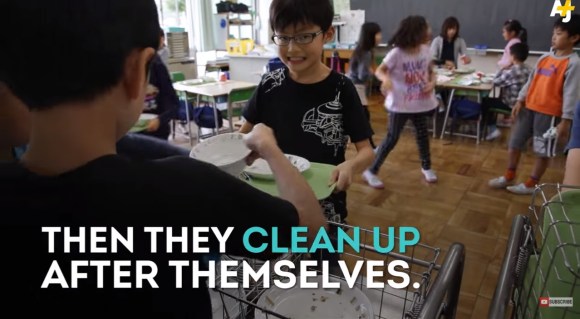
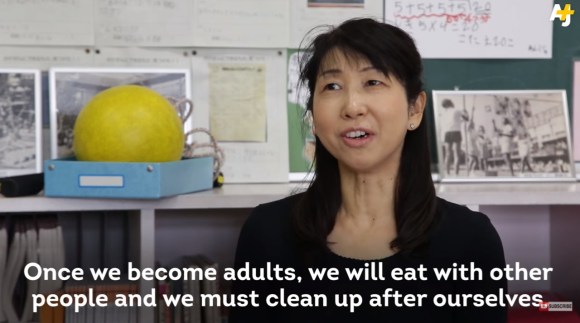
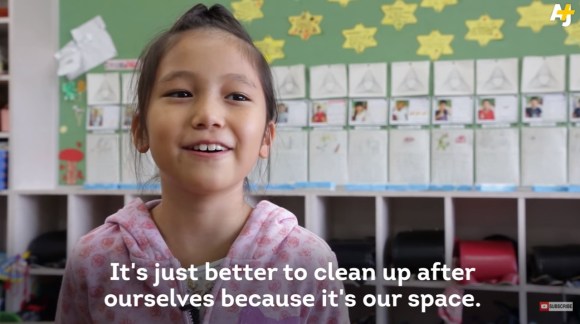
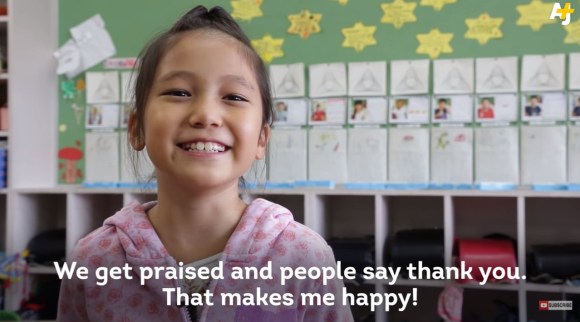
 Student gets a huge surprise when his teachers finds out he doodled anime’s Naruto on his report
Student gets a huge surprise when his teachers finds out he doodled anime’s Naruto on his report Shibuya gives each public elementary and junior high student a Surface Go 2 tablet for school
Shibuya gives each public elementary and junior high student a Surface Go 2 tablet for school Is Japan overworking its teachers? One exhausted educator says, “YES!”
Is Japan overworking its teachers? One exhausted educator says, “YES!” Nintendo to give Labo kits to U.S. elementary schools, but not Japanese schools. Why?
Nintendo to give Labo kits to U.S. elementary schools, but not Japanese schools. Why? How to order snacks on a Shinkansen bullet train in Japan
How to order snacks on a Shinkansen bullet train in Japan Japan’s new difficult-to-drink-from beer glass protects your liver, but it’s a brutal experience
Japan’s new difficult-to-drink-from beer glass protects your liver, but it’s a brutal experience Demon Slayer: Kimetsu no Yaiba gets new roller coaster attractions and food at Universal Studios Japan
Demon Slayer: Kimetsu no Yaiba gets new roller coaster attractions and food at Universal Studios Japan Burger King Japan suddenly adds Dr. Pepper and Dr. Pepper floats to its menu nationwide
Burger King Japan suddenly adds Dr. Pepper and Dr. Pepper floats to its menu nationwide New Pokémon ice cream, dessert drinks, and cool merch coming to Baskin-Robbins Japan【Pics】
New Pokémon ice cream, dessert drinks, and cool merch coming to Baskin-Robbins Japan【Pics】 New Nintendo Lego kit is a beautiful piece of moving pixel art of Mario and Yoshi【Photos】
New Nintendo Lego kit is a beautiful piece of moving pixel art of Mario and Yoshi【Photos】 New samurai glasses are Japan’s latest weird must-have souvenir
New samurai glasses are Japan’s latest weird must-have souvenir Kyoto Tower mascot termination reveals dark side behind cute Japanese characters
Kyoto Tower mascot termination reveals dark side behind cute Japanese characters Hello, cosmetics! Clinique teams up with Hello Kitty this summer for first-time collaboration
Hello, cosmetics! Clinique teams up with Hello Kitty this summer for first-time collaboration This Nara workshop has been making deer crackers for more than 100 years and offers tours【Photos】
This Nara workshop has been making deer crackers for more than 100 years and offers tours【Photos】 Nintendo history you can feel – Super NES, N64, and GameCube controllers become capsule toys
Nintendo history you can feel – Super NES, N64, and GameCube controllers become capsule toys “The most Delicious Cup Noodle in history” – Japan’s French Cup Noodle wins our heart【Taste test】
“The most Delicious Cup Noodle in history” – Japan’s French Cup Noodle wins our heart【Taste test】 Starbucks releases a cute Frappuccino and Unicorn Cake…but not in Japan
Starbucks releases a cute Frappuccino and Unicorn Cake…but not in Japan McDonald’s Japan’s Soft Twist Tower: A phantom ice cream only sold at select branches
McDonald’s Japan’s Soft Twist Tower: A phantom ice cream only sold at select branches Yabai Ramen: What makes this Japanese ramen so dangerous?
Yabai Ramen: What makes this Japanese ramen so dangerous? Finally! Nintendo Japan expands Switch 8-bit controller sales to everybody, Online member or not
Finally! Nintendo Japan expands Switch 8-bit controller sales to everybody, Online member or not Japanese government wants to build luxury resorts in all national parks for foreign tourists
Japanese government wants to build luxury resorts in all national parks for foreign tourists To combat declining birth rate, Japan to begin offering “Breeding Visas” to foreigners
To combat declining birth rate, Japan to begin offering “Breeding Visas” to foreigners 10 things you should buy at 7-Eleven in Japan
10 things you should buy at 7-Eleven in Japan Studio Ghibli releases anime heroine cosplay dresses that are super comfy to wear
Studio Ghibli releases anime heroine cosplay dresses that are super comfy to wear Woman charged for driving suitcase without a license in Osaka
Woman charged for driving suitcase without a license in Osaka Studio Ghibli unveils My Neighbour Totoro miniature house model
Studio Ghibli unveils My Neighbour Totoro miniature house model Kyoto experiencing problems with foreign tourists not paying for bus fares, but not on purpose
Kyoto experiencing problems with foreign tourists not paying for bus fares, but not on purpose Fighting mild hunger with a Japanese soda that turns into jelly in the stomach【Taste test】
Fighting mild hunger with a Japanese soda that turns into jelly in the stomach【Taste test】 Studio Ghibli’s Howl’s Moving Castle tapestry unveiled in Japan for first time
Studio Ghibli’s Howl’s Moving Castle tapestry unveiled in Japan for first time McDonald’s new Happy Meals offer up cute and practical Sanrio lifestyle goods
McDonald’s new Happy Meals offer up cute and practical Sanrio lifestyle goods Sales of Japan’s most convenient train ticket/shopping payment cards suspended indefinitely
Sales of Japan’s most convenient train ticket/shopping payment cards suspended indefinitely Sold-out Studio Ghibli desktop humidifiers are back so Totoro can help you through the dry season
Sold-out Studio Ghibli desktop humidifiers are back so Totoro can help you through the dry season Japanese government to make first change to romanization spelling rules since the 1950s
Japanese government to make first change to romanization spelling rules since the 1950s Foreigner’s request for help in Tokyo makes us sad for the state of society
Foreigner’s request for help in Tokyo makes us sad for the state of society Ghibli founders Toshio Suzuki and Hayao Miyazaki contribute to Japanese whisky Totoro label design
Ghibli founders Toshio Suzuki and Hayao Miyazaki contribute to Japanese whisky Totoro label design Doraemon found buried at sea as scene from 1993 anime becomes real life【Photos】
Doraemon found buried at sea as scene from 1993 anime becomes real life【Photos】 Tokyo’s most famous Starbucks is closed
Tokyo’s most famous Starbucks is closed Princesses, fruits, and blacksmiths: Study reveals the 30 most unusual family names in Japan
Princesses, fruits, and blacksmiths: Study reveals the 30 most unusual family names in Japan Japanese schools are losing their pools due to rising maintenance costs and aging facilities
Japanese schools are losing their pools due to rising maintenance costs and aging facilities “Let them eat furikake!” says Mayor Hashimoto as Osaka school lunch saga rumbles on
“Let them eat furikake!” says Mayor Hashimoto as Osaka school lunch saga rumbles on High school teacher’s summer vacation homework about appreciating life brings tears to our eyes
High school teacher’s summer vacation homework about appreciating life brings tears to our eyes Don’t like trigonometry? Then you’re just like Hitler, says Japanese high school English teacher
Don’t like trigonometry? Then you’re just like Hitler, says Japanese high school English teacher Teacher disciplined for drinking alcohol during class in Japan
Teacher disciplined for drinking alcohol during class in Japan Curry restaurants across Japan create social media movement: “Don’t blame the curry!”
Curry restaurants across Japan create social media movement: “Don’t blame the curry!” Japanese high school teacher’s scathing, two-foot-long note to students is nothing short of epic
Japanese high school teacher’s scathing, two-foot-long note to students is nothing short of epic Japanese school renames boys, girls uniforms as “Type I” and “Type II” in gender identity reform
Japanese school renames boys, girls uniforms as “Type I” and “Type II” in gender identity reform Thai commercial tugs at our heartstrings, reminds us to call our parents more often【Video】
Thai commercial tugs at our heartstrings, reminds us to call our parents more often【Video】 Japanese public school to allow male students to wear skirts, chest ribbons as part of uniform
Japanese public school to allow male students to wear skirts, chest ribbons as part of uniform Teacher facing charges after swallowing class pet alive
Teacher facing charges after swallowing class pet alive Japanese government promises reduced teacher responsibilities, right to refuse club supervision
Japanese government promises reduced teacher responsibilities, right to refuse club supervision Majority of Nagasaki high schools and middle schools have white-underwear-only rules, study finds
Majority of Nagasaki high schools and middle schools have white-underwear-only rules, study finds
Leave a Reply